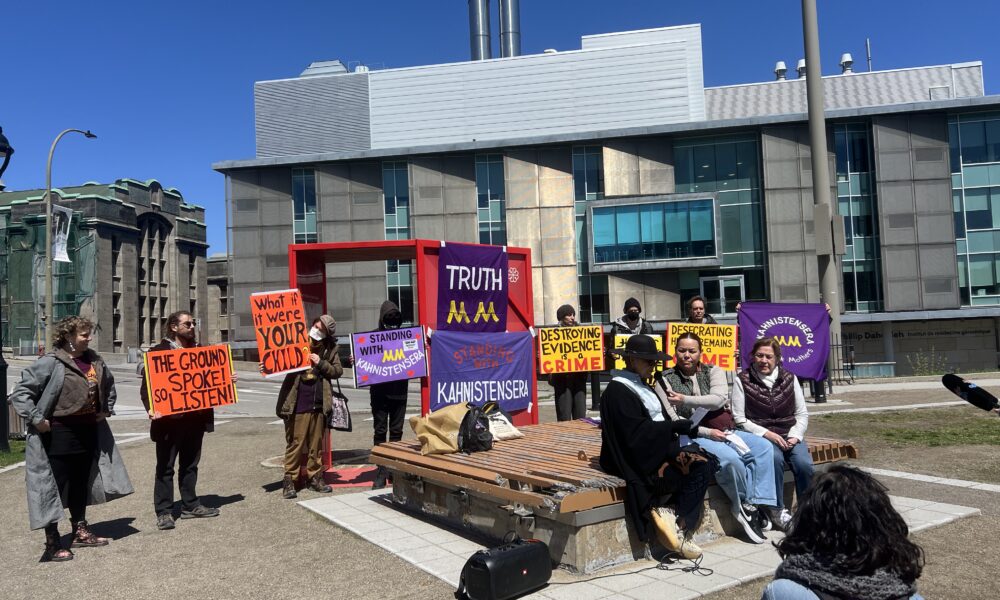At a press conference on April 30, the Kanien’kehá:ka Kahnistensera (Mohawk Mothers) alleged that McGill University and the Société québécoise des infrastructures (SQI) found new evidence of human remains earlier this month at the site of the New Vic Project, where an ongoing investigation into possible unmarked graves is underway. The Mothers claim that McGill did not share its latest findings report with them, despite their previous settlement agreement requiring transparent communication between the two parties.
The Mohawk Mothers have been in a legal battle with McGill since 2015 over the construction of the New Vic Project, an $870 million CAD development which the Mothers claim is the site of unmarked Indigenous graves. The site hosts the former Allan Memorial Institute, where parts of the CIA’s MK-Ultra program—an unethical mind-control experiment conducted in the 1950s and 60s—were carried out.
On April 6, 2023, the Mothers reached a historic settlement agreement with McGill, SQI, the Royal Victoria Hospital, the City of Montreal, and the Attorney General of Canada, mandating a comprehensive investigation into the site and a jointly appointed archaeologist panel to oversee work on the site. When the panel disbanded in August 2023, the Mothers turned to the Superior Court of Quebec, which ordered McGill to reinstate it. McGill successfully appealed, and the Supreme Court of Canada later declined to hear the Mothers’ appeal. As a result, the panel remains inactive.
During the press conference, the Mothers detailed the potential evidence found on the site following their agreement with McGill: Hundreds of small bone fragments of unknown origin, fragments of two children’s shoes from the early 20th century, and alerts from historic human remains detection dogs (HHRDDs). The Mothers cited a study indicating that there is only a 0.6 per cent chance of two HHRDDs falsely identifying remains at a site—three separate dogs indicated the presence of possible remains at the New Vic site.
The new report allegedly suggests the presence of remains at the site based on the culmination of evidence from three separate remote sensing technologies in the past two years: Ground penetrating radar, human remains detection dogs, and most recently, an S4 Subterra Grey probe, which is specially designed to detect unmarked graves.
In an interview with The Tribune, Mohawk Mother Kwetiio described her conflicting emotions surrounding their discovery of the report.
“It’s very bittersweet because you would like to think that there’s nothing there,” Kwetiio told The Tribune. “I didn’t want anything to be there, and yet I wanted them to be found [….] It just brings back all of the trauma.”
In a written statement to The Tribune, McGill’s Media Relations Office (MRO) wrote that the most recent report on the presence of remains was commissioned by the SQI, not by McGill, as the land in question falls under the SQI’s purview. The MRO also denied the Mothers’ claims that human remains are on the site.
“Since work on the New Vic project has been launched, no human remains, or unmarked grave indicators of any sort have been found,” the MRO wrote. “McGill has respected the spirit and the [settlement agreement] since its inception.”
In light of these developments, Mohawk Mother Kahentinetha told The Tribune that the Mothers sent a letter the morning of April 30 to the Assistant Chief Coroner of Quebec, Géhane Kamel, requesting that she intervene to prevent McGill’s further excavation of the site, which could damage potential evidence.
“We […] asked the coroner to work with Indigenous experts, a Mohawk medical pathologist, and a Mohawk archaeologist alongside cultural monitors to ensure a credible, transparent and impartial investigation,” Kahentinetha said.
Phillippe Blouin, an anthropologist and associate of the Mothers, elaborated on the importance of McGill’s collaboration with Indigenous Peoples themselves.
“All this talk about reconciliation has to lead to meaningful action with the [Indigenous] people actually existing here,” Blouin said. “There are people all around, many are in Kahnawà:ke, and they have specific demands.”
Despite their efforts, Kahentinetha highlighted the ongoing challenge the Mothers face in establishing productive communication with McGill. While they have attempted to engage in direct dialogue with the institution, they claim that the response has been largely unresponsive.
“You know what I would like to do, and I tried to do, is […] talk to them and tell them about us, tell them how we feel, who we are, understand us, what our role is, and let’s talk together about it,” Kahentinetha said. “We’ve tried to do that, but it hasn’t worked. I hope it will.”








